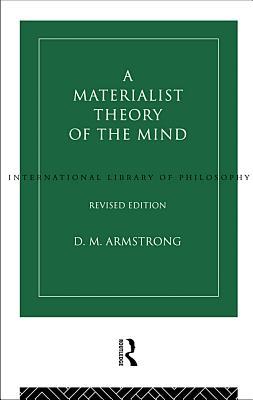What do you think?
Rate this book


This classic work of recent philosophy was first published in 1968, and remains the most compelling and comprehensive statement of the view that the mind is material or physical. In A Materialist Theory of the Mind, D. M. Armstrong provided insight into the debate surrounding the relationship of the mind and body. He put forth a detailed materialist account of all the main mental phenomena, including perception, sensation, belief, the will, introspection, mental images, and consciousness. This causal analysis of mental concepts, along with the similar theory by David Lewis, has come to dominate all subsequent debates in the philosophy of mind.
In the preface to this updated edition, Armstrong reflects on the impact of the book, and places it in the context of subsequent developments. A full bibliography of all the key writings that have appeared in the materialist debate is also provided.
400 pages, Kindle Edition
First published September 23, 1993